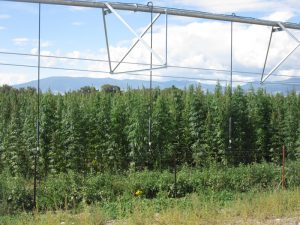
(Photo courtesy of Colorado Department of Agriculture)
Confusion at the federal level about water is causing a huge dilemma for hemp producers: Licensing deadlines are fast approaching in many states, but farmers don’t know if they’ll be able to irrigate their crops.
That’s because the nation’s largest wholesale supplier of water – the U.S. Bureau of Reclamation – won’t allow its water to be used for hemp irrigation, even when growing the plant is authorized under other federal legislation.
And a bill in Congress to fix the confusion has stalled.
“I’m not sure what I’m going to do,” said Kimberley Phillips of Montana, who has leased 75 acres near Helena to grow hemp but can’t decide whether to plant it.
“It really is killing me. I’m in the hunt now for land that’s legal to irrigate, but there are not a lot of options,” said Phillips, who has had to settle for assisting another hemp grower on 4 acres with water rights.
Phillips is mulling a lawsuit against the Bureau, hoping to get temporary water access until Congress acts.
In the meantime, she’s planning to apply for a Montana hemp license and permission from the U.S. Drug Enforcement Administration to import seeds.
Phillips’ dilemma isn’t unique, though the magnitude of the problem is unclear.
Many U.S. farmers rely on Bureau of Reclamation water, especially in the West, so the possibility of jeopardizing their current supply deters them from applying for hemp licenses.
“There are a lot of farmers who want to try hemp,” Phillips said, “but they’re not going to risk their water for it.”
U.S. Sen. Michael Bennet sponsored a bill last summer to resolve the problem. The Democrat’s home state, Colorado, is the nation’s largest hemp producer.
“This is a necessary measure to fix conflicting federal policies that are slowing the implementation of the (hemp) pilot program and stifling new business opportunities,” Bennet told Marijuana Business Daily last month.
But Bennet’s Industrial Hemp Water Rights Act hasn’t even gotten a hearing, even though five other Western senators signed on as co-sponsors.
The bill could see action in 2018, especially if it’s amended into the 2018 Farm Bill or is part of either expected legislation on infrastructure or the federal budget.
“At the very least, Colorado’s farmers deserve a clear path to boost growth in our agriculture economy,” Bennet said.
But water policy is complicated stuff, and any changes to Western water usage sets states bickering.
For farmers like Phillips, there’s no time to waste.
“I’ve got to decide pretty soon what to do,” she said.

